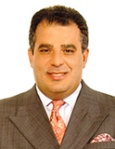Q & A with Enrique de Marchena, President of the Caribbean Hotel Association (CHA)


The Caribbean Hotel Association (CHA) will soon be renamed as the Caribbean Hotel & Tourism Association (CHTA) in an effort to integrate under that new acronym all sectors of the region’s travel and tourism private field. This is only one of the first projects in the pipeline for the organization’s new front office that, as a matter of fact, is determined to keep up the good work and continue grabbing outbound markets and investments out of Europe, let alone position the Caribbean as a single travel destination.
Q.- You’re the second Spanish-speaking president CHA has ever elected, in addition to being from the Dominican Republic. What kind of philosophy will you try to implement in this organization?
A.- CHA is an organization with over 48 years under its belt and, and you’ve just said, I’m the second Spanish-speaking and the second Dominican-born president this institution has ever had. As far as my philosophy is concerned, I believe this kind of institution allows us, first of all, to raise a voice of solidarity and struggle from the travel and tourism private sector.
One of the good news I’ll be braking to you is that, following the CHA Membership Assembly next month, CHA will be renamed as the Caribbean Hotel & Tourism Association (CHTA). This change of name intends to highlight the job that CHA has been doing for so many years now. This is directly related to one of my top priorities at the helm of the organization which is the all-out integration not only of the private sector, but also of all of the industry’s sub-sectors, like airports, airlines, marinas, theme parks, all of them integrated to CHA.
In addition to that, we’ve continued working closely with the Caribbean Tourism Organization (CTO) and this summit we held in Washington is precisely a joint effort of both CHA and CTO, an organization whose members represent the region’s public sector in terms of the travel industry. We’re going to step up integration efforts between CTO and CHA, especially now that the entire world and the region in particular are coping with a galloping crisis linked to skyrocketing oil prices and airlift cutbacks. We want to work together to come up with solutions that could eventually guarantee far more flight seats toward the Caribbean region.
Q.- What can you say about your organization’s position toward Europe, especially toward Spain and FITUR, one of the world’s largest travel fairs?
A.- We were the first ones to promote the first meeting that took place between the huge Spanish hotel chains and the major Caribbean tourism stakeholders. I’m talking about that first summit in Majorca, back in September last year, that was a huge success and that prompted big-time Spanish investors in the Caribbean to form Inverhotel, the organization that gathers them now.
From the moment Adolfo Fabieres was picked to lead Inverhotel, we’ve maintained monthly contacts with him, we’ve met in the Dominican Republic and in Europe in a bid to follow up on the conversations, keep the communication lines open and achieve far greater engagement of Spanish hotel chains with CHA.
We’re now planning a follow-up meeting to that held last year in Majorca and we want to do it somewhere between September and October this year. I think it’s in the best interest of both groups to integrate and work together, mainly now that we’re dealing with this international crisis that’s calling on the Caribbean to remain in a one piece as a single travel destination. As many as 30 to 35 percent of all hotel guestrooms in the Caribbean are run by Spain-based companies, so I insist it’s in the best interest of those groups out of Spain to be a part of CHA, and it’s in our best interest to count on their support every step of the way.
Q.- What do you make of those huge Spanish hotel chains that don’t want to be a part of CHA?
A.- I think they’ve got a narrow-minded, shortsighted vision of the picture for exactly the same reasons I explained to you at the top of this interview. We’re living a time of crisis and when things go wrong you just can’t go hanging around out there like a lone ranger. When crises hit hard, like the one we’re facing now, the first thing you’ve got to do is unite to be stronger.
Q.- Will CHTA attend FITUR with a booth of its own early next year?
A.- This is an excellent question I don’t have an answer for right now. However, I can tell you that the more Spanish hotel chains join the organization and other private institutions in the Caribbean, the more Caribbean organizations will be attending FITUR, either next year or the year after next. This is actually a two-way street.
Q.- How is the fusion of CTO and CHA faring right now and how does this entire matter play out in the face of the Dominican administration’s decision to step out of CTO?
A.- I also think the Dominican Republic is lacking the vision to get the big picture. It’s been two years since the Dominican Republic stopped having a hands-on attitude toward CTO, As a result of that, the country owes two years worth of quotas. I believe it’s wrong and it definitely goes against the grain in terms of the foreign policy the administration of President Fernandez is pursuing.
I believe in integration and I think in a time of crisis like this, the Dominican Republic has no other choice but to join the Caribbean community. The Dominican Republic must understand it can’t weather this storm all by itself, but from the context of the entire Caribbean region. We’re just one of the many island nations that make up the great Caribbean region.














